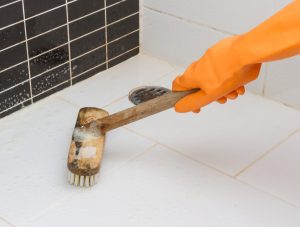 If you have hard water in the home, it means that your H2O contains large amounts of minerals, such as limestone, calcium, and magnesium. It’s perfectly safe to use but it can have some pretty serious consequences on your house over time. A more serious problem is lime scale buildup which will eventually develop in your plumbing and impede proper water flow. But mineral-enriched water can also cause smaller troubles around the home: hard water stains. Whatever it touches can begin to spot and tarnish, including dishes, glasses, clothes, toilets, showers, sinks, and even your car. So it’s always a good idea to invest in hard water stain removal early on before it wrecks havoc on your entire house.
If you have hard water in the home, it means that your H2O contains large amounts of minerals, such as limestone, calcium, and magnesium. It’s perfectly safe to use but it can have some pretty serious consequences on your house over time. A more serious problem is lime scale buildup which will eventually develop in your plumbing and impede proper water flow. But mineral-enriched water can also cause smaller troubles around the home: hard water stains. Whatever it touches can begin to spot and tarnish, including dishes, glasses, clothes, toilets, showers, sinks, and even your car. So it’s always a good idea to invest in hard water stain removal early on before it wrecks havoc on your entire house.
Beware of the Blemishes
Since we use most of our water in the bathroom, hard water stains often occur on showers, tubs, and sinks. Typically it appears as a thin film of rough powder on various surfaces (especially glass, plastic, and porcelain) since mineral-based water has a difficult time dissolving soap. However, it can become more serious when metal is involved. If the moisture has high iron content, it can leave behind a red tinted slime. Brass or copper fixtures could develop blue-green rust due to acidic ingredients in your water supply. But the problem doesn’t just involve your bathroom: if your water can’t get the soap out, it can also develop on your dishes, clothes, and eventually clog your appliances.
Hard Water Stain Removal
One easy answer is abrasive cleaners that can be bought at the store, but to avoid the extra costs there are all kinds of home remedies for hard water stains. A lot of it is simple chemistry: a mixture of ammonia here, a dilution of some vinegar there, and you’ll immediately have some mineral-fighting solutions. For example, put some lemon juice into a spray bottle and lightly apply it to your shower doors, tub, sink, or faucets, let it stand, and then wipe it off (it may take a few applications to completely eliminate the scum). Or pour a couple cups of white vinegar into your toilet and scrub, or pour it into the tank and flush away the buildup. And for more severe stains (slime, rust, and corrosive tarnishes) there is a slough of household chemicals that can be used, such as ammonia, hydrochloric acid, oxalic acid, or other strong compounds. But make sure you know how to use and dilute these elements before applying them to your fixtures.
Ready to start your Hard Water Stains?
Find ProsSecret Solutions
Though the concept behind each solution may be scientifically simple, it’s often hard to know which mixture works best, how they’re made, and what ratios and dilutions to use. Therefore, you may want to hire a maid service your first time out: they’ll clean the entire house from top to bottom, but they may have also found the perfect commercial product or homemade concoction that not only gets rid of the present buildup but can possibly prevent it in the future. Many times, if asked politely, they’ll be more than willing to share their secrets. From there, you can take care of hard water stains yourself, though it’s not a bad idea to hire back the same service for a bi-annual cleaning. Plus, if lime scale develops in your appliances or pipes, their lifespan will be quickly shortened, so you may want to hire a plumber for additional advice, inspection, and elimination of the problem for those hard to reach areas.
Proven Prevention
The best way to avoid lime scale buildup is to stay on top of it. Take one day a week and spray down your shower with vinegar or commercial cleansers before it gets bad (remember, soap and water won’t only not work, it’ll make it worse). Once a month, pour some lemon juice or vinegar in your commode and flush. But better yet, for surefire hard water stain removal, it’s a wise idea to invest in a water softening system. These machines will filter out the minerals before it reaches your plumbing, faucets, and appliances. Plus, you’ll get an immediate return on your investment: no longer will your clothes be spotted, your skin irritated, or your hair tangled from soap buildup. Also, it’ll eventually save you money and headaches in the long run by reducing the chances of future repair, replacements, or renovations.
 How to Clean a Bathroom
How to Clean a Bathroom  How to Clean a Bathtub
How to Clean a Bathtub  How To Clean a Shower
How To Clean a Shower  How To Clean Shower Doors
How To Clean Shower Doors  Air Duct Cleaning
Air Duct Cleaning 

Have an ongoing problem with hard water stains in the toilet, both at water level and the sides. What seems to really help is to have a spray bottle filled with vinegar and distilled water to be sprayed on sides and into water in bowl after each flush.